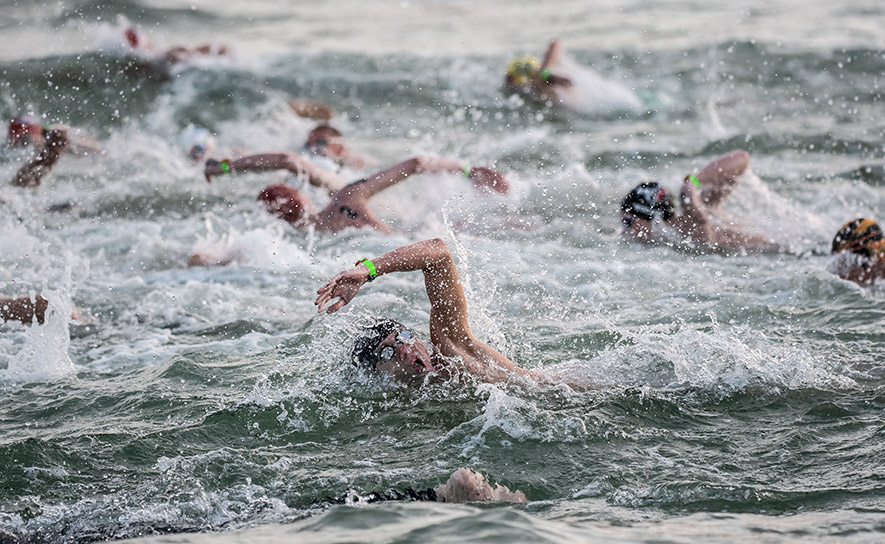USA Swimming News
Wednesday, October 6, 2021
Top Misconceptions in Open Water Swimming

Open water swimming’s popularity continues to grow as more athletes across the country decide the sacred black line isn’t the only thing they want to follow during a race. For many swimmers, open water allows the opportunity to try new races while still competing in the sport they love. If you are thinking about trying open water swimming (but aren’t quite sure it is for you), check out the most common misconceptions below.
Misconception No. 1: You have to train in open water.
For those of you that love following the black line during practice, don’t worry – open water swimming does not require you to train outside of the pool. Since access to open water such as lakes and the ocean can be limited, all athletes can prepare and train in or out of a swimming pool. Many open water swimmers train in the pool with their distance counterparts to prepare for open water races.
Misconception No. 2: Open water swimming can negatively impact pool swimmers’ times.
The belief that open water swimming makes you slower in the pool is a wide misconception across many pool swimmers. Since open water swimming provides new race and practice environments, athletes have said they found a new passion and confidence in the sport. Take it from our Olympic Games Tokyo 2020 Open Water athletes, Haley Anderson, Ashley Twichell and Jordan Wilimovsky, - who all have impressive pool careers in addition to open water.
Misconception No. 3: Open water requires a different stroke.
In the past, many pool swimmers thought you needed to create a new stroke when swimming in open water. Lucky for you, that is false! Many swimmers keep their same stroke whether they are in the pool or in open water, and adjust aspects such as tempo, catch and kick based on where they are in their race.
Misconception No. 4: Training for open water is different than training for the 800- or 1500-meter freestyle.
Typically, open water swimmers train with their pool teammates who swim the 800m or 1500m freestyle. Speed-work between distance pool events and open water races are roughly the same. Although training is very similar, open water swimming does offer the purest form of racing – where athletes race against one another and not the clock at meets. In addition, race strategies and conditions are constantly changing, which makes adaptability a key skill - something many open water swimmers love about the sport.
Misconception No. 5: There aren’t opportunities available in open water swimming.
Open water swimmers have many of the same opportunities that their colleagues in the pool have, including qualifying for the National Team, attending international meets such as World Championships and the Olympics, as well as qualifying for age group camps and scholarships. Open water athletes can also garner sponsorships based on performance.
Want to watch an open water race before deciding to dive in? The Open Water National Team will be selected at the Open Water Champions Cup, held October 8-10 in Las Vegas, Nevada. Check back with USA Swimming to stay up to date on who made the team.
To learn more about getting involved in open water swimming, please visit https://www.usaswimming.org/swimmers-parents/swimmers/open-water.
Misconception No. 1: You have to train in open water.
For those of you that love following the black line during practice, don’t worry – open water swimming does not require you to train outside of the pool. Since access to open water such as lakes and the ocean can be limited, all athletes can prepare and train in or out of a swimming pool. Many open water swimmers train in the pool with their distance counterparts to prepare for open water races.
Misconception No. 2: Open water swimming can negatively impact pool swimmers’ times.
The belief that open water swimming makes you slower in the pool is a wide misconception across many pool swimmers. Since open water swimming provides new race and practice environments, athletes have said they found a new passion and confidence in the sport. Take it from our Olympic Games Tokyo 2020 Open Water athletes, Haley Anderson, Ashley Twichell and Jordan Wilimovsky, - who all have impressive pool careers in addition to open water.
Misconception No. 3: Open water requires a different stroke.
In the past, many pool swimmers thought you needed to create a new stroke when swimming in open water. Lucky for you, that is false! Many swimmers keep their same stroke whether they are in the pool or in open water, and adjust aspects such as tempo, catch and kick based on where they are in their race.
Misconception No. 4: Training for open water is different than training for the 800- or 1500-meter freestyle.
Typically, open water swimmers train with their pool teammates who swim the 800m or 1500m freestyle. Speed-work between distance pool events and open water races are roughly the same. Although training is very similar, open water swimming does offer the purest form of racing – where athletes race against one another and not the clock at meets. In addition, race strategies and conditions are constantly changing, which makes adaptability a key skill - something many open water swimmers love about the sport.
Misconception No. 5: There aren’t opportunities available in open water swimming.
Open water swimmers have many of the same opportunities that their colleagues in the pool have, including qualifying for the National Team, attending international meets such as World Championships and the Olympics, as well as qualifying for age group camps and scholarships. Open water athletes can also garner sponsorships based on performance.
Want to watch an open water race before deciding to dive in? The Open Water National Team will be selected at the Open Water Champions Cup, held October 8-10 in Las Vegas, Nevada. Check back with USA Swimming to stay up to date on who made the team.
To learn more about getting involved in open water swimming, please visit https://www.usaswimming.org/swimmers-parents/swimmers/open-water.
Related Articles
ARTICLE
How can athletes ditch procrastination in sport and life?
May 23, 2025
ARTICLE
3 Easy Ways to Make Healthy Habits Part of Your Team Culture
May 20, 2025
ARTICLE
Four Additional Coaching Network Webinars and New High Performance Category Added to USA Swimming University
May 19, 2025
ARTICLE
USA Swimming, USA Swimming Foundation Announce 2025 Historically Black Colleges and Universities Grant Recipients
May 14, 2025
ARTICLE
How to Help Your Athlete Avoid the Pitfalls of Perfectionism
May 12, 2025
ARTICLE
USA Swimming, USA Swimming Foundation Release 2025 Community Impact Grant Recipients
May 7, 2025
ARTICLE
Fifty-Five Athletes Named to the National Diversity Select Camp Roster
May 1, 2025
ARTICLE
USA Swimming Foundation Awards $865,000 in 2025 Learn-to-Swim Grant Funding for Swim Lesson Providers
Apr 28, 2025
ARTICLE
Is that expensive food really better?
Apr 22, 2025

